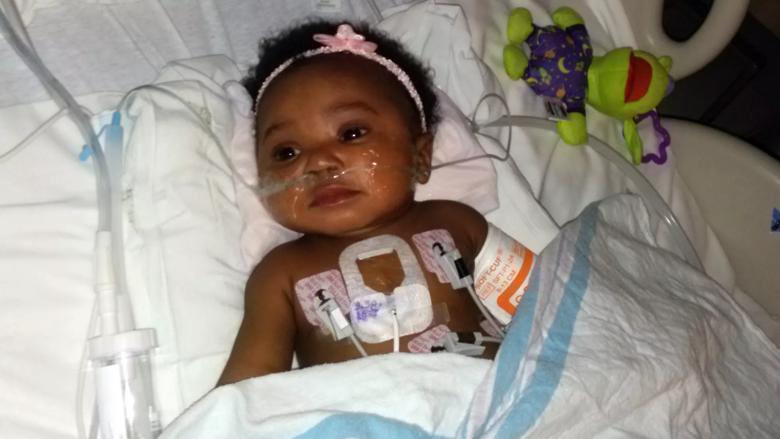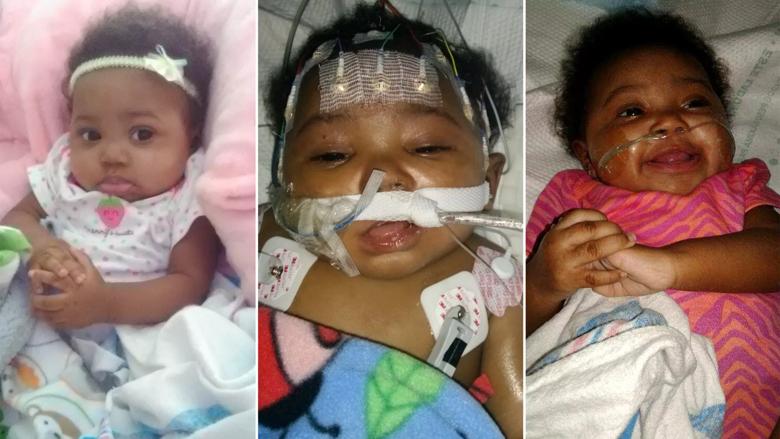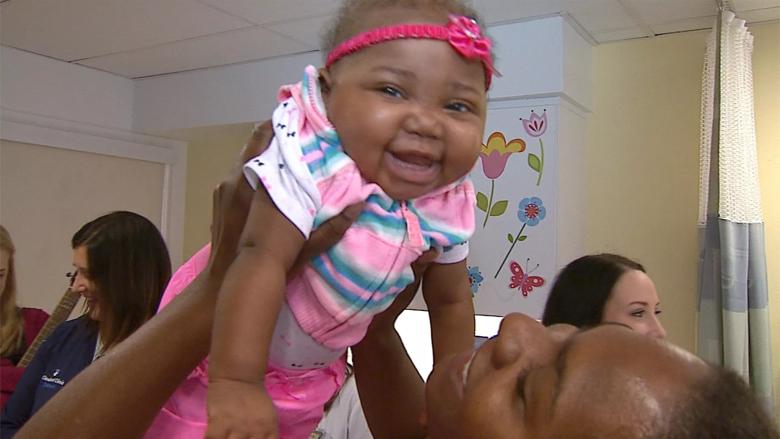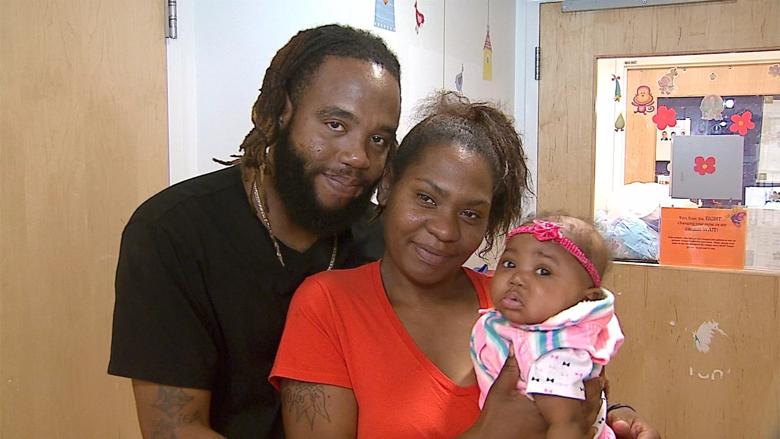Cleveland Clinic Children's Doctors Treat Hospital's Youngest Bone Marrow Transplant Recipient
Cleveland Clinic News Service | 216.444.0141
We’re available to shoot custom interviews & b-roll for media outlets upon request.
CCNS health and medical content is consumer-friendly, professional broadcast quality (available in HD), and available to media outlets each day.

Sitting contentedly on her daddy’s lap, dressed in bright pink from head to toe, little Denniya Rawls is a portrait of health.
Sweet baby Denniya is now a happy, healthy 11-month-old thanks to a lifesaving bone marrow transplant: https://t.co/a4LSVxo0dz pic.twitter.com/YelPYoJmLJ
— Cleveland Clinic (@ClevelandClinic) November 8, 2017
But it wasn’t too long ago she was on “the doorstep of death,” as Dr. Rabi Hanna described it, when 3-month-old Denniya was rushed to Cleveland Clinic Children’s pediatric intensive care unit (PICU) in March 2017, suffering from a high fever.
RELATED: Seven-Month-Old Baby with Rare Disease Has Successful Bone Marrow Transplant
Dr. Hanna, Chair of the Department of Hematology- Oncology and Bone Marrow Transplant at Cleveland Clinic Children’s, quickly diagnosed Denniya with an extremely rare – and potentially deadly – immune system disorder: hemophagocytic lymphohistiocytosis (HLH). Immediately, Denniya began chemotherapy and blood transfusions to stabilize her condition in preparation for the procedure needed to save her life: a bone marrow transplant.

Image content: This image is available to view online.
View image online (https://assets.clevelandclinic.org/transform/fb13581c-592a-4eed-997f-ea0d5efe907a/bone-marrow-denniya-hospital-11082017_jpg)
Denniya spent over 100 days at Cleveland Clinic Children’s, where she received a life-saving bone marrow transplant.
“If not diagnosed early and treated very aggressively, HLH can often be fatal,” explains Dr. Hanna. “But Denniya is a fighter.”
In fact, when her father Dennard Rawls excitedly found out Robin Rawls was pregnant with their baby girl, he stated, “You can’t deny a miracle.” The phrase caught on, and formed the basis for their daughter’s name, Denniya (pronounced deh-NYE-uh).
RELATED: Cleveland Clinic Children’s Bone Marrow Transplant (BMT) Program
But Denniya could easily have been denied the bone marrow transplant she needed to survive, since African-Americans are underrepresented on the National Marrow Donor Program® registry, called Be The Match®. And since no match was found within her family, Denniya faced long odds in getting a donor before her improved condition would inevitably worsen.

Image content: This image is available to view online.
View image online (https://assets.clevelandclinic.org/transform/e2a99219-ce4c-4d24-90a6-bacb001bfe6d/one-marrow-denniya-hospital-tripane-1082017_jpg)
Denniya spent over 100 days at Cleveland Clinic Children’s, where she received a life-saving bone marrow transplant.
When a match was found with an anonymous donor (a 54-year-old woman) less than two months later, mom Robin was overjoyed. “Words can’t really explain how grateful we felt,” says Robin. “We are so blessed. Without that donor, it never would have happened.”
Dr. Hanna performed the bone marrow transplant in June, making Denniya the youngest-ever bone marrow recipient at Cleveland Clinic Children’s. Her health and prognosis have improved steadily, and Denniya was able to return home in July – about 100 days after being rushed to the hospital.

Image content: This image is available to view online.
View image online (https://assets.clevelandclinic.org/transform/31bd75f6-c036-49f7-be6b-ac16470d482c/Baby-Denniya_jpg)
Denniya spent over 100 days at Cleveland Clinic Children’s, where she received a life-saving bone marrow transplant.
Now, Robin revels in feeding, bathing and caring for her daughter, instead of “watching other people do it when she was hooked up to all those tubes” in the hospital. Life is, at last, pretty routine for the family other than administering a daily regimen of medications for Denniya and making frequent doctor visits.
They look forward to a normal life for Denniya, one that didn’t seem possible just six months ago when her death appeared to be inevitable. But Robin’s perspective changed soon after they arrived at Cleveland Clinic.

Image content: This image is available to view online.
View image online (https://assets.clevelandclinic.org/transform/30e043e6-cbef-4d00-a2a6-e4ae4e7fbdf4/Family-3_jpg)
Denniya spent over 100 days at Cleveland Clinic Children’s, where she received a life-saving bone marrow transplant.
“Dr. Hanna, the nurses, all the staff – I didn’t know a hospital could love her that much,” she avows. “They took care of her and tried to accommodate us as much as they could. They were amazing.”
And one day, Dennard hopes they will have the opportunity to introduce Denniya to the still-anonymous woman who gave her the gift of life. “Everybody needs help at some time in their life, and for her donor to step up and help was a real blessing.”
Thousands of patients with blood cancers like leukemia and lymphoma, sickle cell anemia or other life-threatening diseases depend on the Be The Match Registry to find a match to save their life. To learn more about how to become listed as a potential donor on the National Marrow Donor Program’s registry, visit https://bethematch.org/.
Related media coverage:
Cleveland Clinic is a nonprofit multispecialty academic medical center that integrates clinical and hospital care with research and education. Located in Cleveland, Ohio, it was founded in 1921 by four renowned physicians with a vision of providing outstanding patient care based upon the principles of cooperation, compassion and innovation. Cleveland Clinic has pioneered many medical breakthroughs, including coronary artery bypass surgery and the first face transplant in the United States. Cleveland Clinic is consistently recognized in the U.S. and throughout the world for its expertise and care. Among Cleveland Clinic’s 82,600 employees worldwide are more than 5,786 salaried physicians and researchers, and 20,700 registered nurses and advanced practice providers, representing 140 medical specialties and subspecialties. Cleveland Clinic is a 6,728-bed health system that includes a 173-acre main campus near downtown Cleveland, 23 hospitals, 280 outpatient facilities, including locations in northeast Ohio; Florida; Las Vegas, Nevada; Toronto, Canada; Abu Dhabi, UAE; and London, England. In 2024, there were 15.7 million outpatient encounters, 333,000 hospital admissions and observations, and 320,000 surgeries and procedures throughout Cleveland Clinic’s health system. Patients came for treatment from every state and 112 countries. Visit us at clevelandclinic.org. Follow us at x.com/CleClinicNews. News and resources are available at newsroom.clevelandclinic.org.
Editor’s Note: Cleveland Clinic News Service is available to provide broadcast-quality interviews and B-roll upon request.